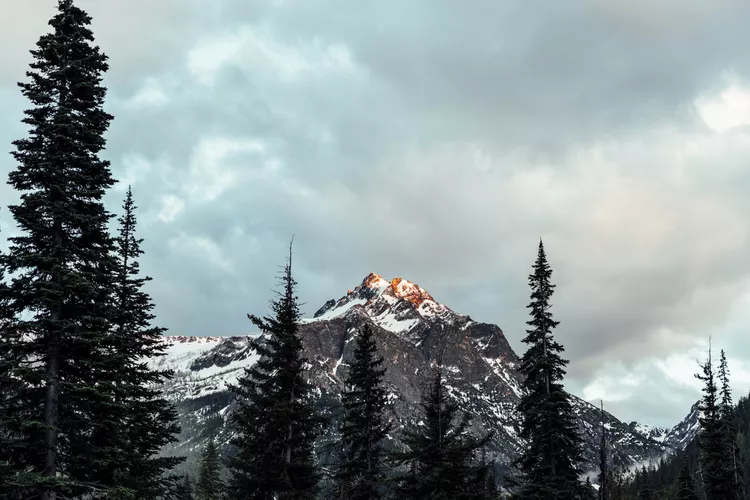Summary
Introduction to North Cascades National Park
North Cascades National Park is a truly remarkable destination. The park’s wilderness is vast, characterized by dense forests, high-mountain lakes, stunning waterfalls, and jagged peaks crowned with glaciers. Mountain goats and black bears roam the landscape, and cell service is practically nonexistent. Visitors can sleep under impossibly dark skies sprinkled with constellations, hike hundreds of miles of trails in absolute solitude, and reconnect with nature.
Although North Cascades National Park is just three hours from Seattle by car, it welcomed a mere 17,855 visitors in 2021 — a staggering number compared to the 14.1 million people who visited the Great Smoky Mountains National Park that year. Consequently, it is the perfect destination for travelers who prefer the tranquility of encountering wildlife rather than fellow hikers.
Moreover, for those who don’t want to veer too far off the beaten path, there are plenty of scenic drives featuring views around every corner along with hiking trails originating from the visitor center. It’s worth noting that the park is just one component of a larger network that includes two national recreation areas: Ross Lake National Recreation Area and Lake Chelan National Recreation Area. Together, they provide nearly 700,000 acres of accessible wilderness year-round, with no park pass required.
:max_bytes(150000):strip_icc():format(webp)/TAL-north-cascades-national-park-04-NCASCADESNP0922-58b49100f6ba43858faa2e0ca8a6806d.jpg)
The Best Hikes in North Cascades National Park
To truly experience the wilderness of North Cascades National Park, it’s essential to leave the comfort of your car behind and hit the trails. The park accommodates all levels of hikers, ensuring everyone finds an experience suited to their capabilities.
North Cascades’ most popular route, the Cascade Pass Trail, is the shortest and easiest way to ascend into the alpine. On this spectacular seven-mile route, you’ll be treated to views of numerous peaks and glaciers. If your legs are up for the challenge, continue on the Sahale Arm Trail to a base of one of the park’s 300 glaciers.
For those seeking diversity in their hike, the Fourth of July Pass trail offers beautiful old-growth forest scenery, while the Easy Pass Trail showcases mountain views enhanced by wildflowers in the spring and summer, as well as vibrant leaves in the fall. However, it’s essential to note that Easy Pass Trail, despite its name, is a strenuous seven-mile round trip.
Hikers wishing to remain closer to civilization can explore the two-mile River Loop Trail, located near North Cascades Visitor Center. This pleasant path winds through lush forest before revealing breathtaking river views. Another popular option for those looking for an easier day hike would be the Thunder Knob Trail, which departs from Colonial Creek Campground and provides ample bench seating along the way.
:max_bytes(150000):strip_icc():format(webp)/TAL-north-cascades-national-park-01-NCASCADESNP0922-cd5843242af5448789b8a27c00c3a54f.jpg)
Camping in North Cascades National Park
There is an abundance of camping opportunities in North Cascades National Park. Along State Route 20, six drive-in campgrounds accommodate tents, RVs, and trailers: Goodell Creek, Lower Goodell Creek (a group site), Gorge Lake, Newhalem Creek, Colonial Creek North, and Colonial Creek South. All are open during the summer, while three campgrounds — Goodell Creek (19 sites), Gorge Lake (eight sites), and 10 walk-in sites at Colonial Creek South — remain open after being winterized.
Services and amenities vary across campgrounds depending on the season, with nightly rates ranging from $20 to $75. Reservations are required in advance here.
Additionally, there are boat-in campsites on Diablo Lake (accessible from the boat launch at Colonial Creek Campground) and a wide variety of backcountry campsites. It’s important to note that all backcountry and boat-in campers on Diablo Lake must obtain a permit. Most permits are available for advance reservation, while others are offered on a first-come, first-served basis.
Backcountry permits cost $26 and can be reserved here. There’s also ample camping, including boat-in and backcountry camping, available at Ross Lake and Lake Chelan Recreation Areas.
:max_bytes(150000):strip_icc():format(webp)/TAL-north-cascades-national-park-02-NCASCADESNP0922-3dacb4d390f8429d8d10db98489f78bb.jpg)
Things to Do in North Cascades National Park
Exploring the numerous trails and camping under pristine dark skies are at the top of many visitors’ to-do lists; however, there’s more to do in North Cascades than just hiking and camping.
In the waters of Gorge and Diablo Lakes, anglers will discover abundant rainbow, eastern brook, and cutthroat trout, while the Skagit River boasts a rich population of steelhead and various trout species.
Beyond the water, visitors will encounter one of the most diverse ecosystems on the planet. Sightings of Columbia black-tailed deer, pikas, and even black bears and mountain goats can be common in particular areas; in addition, over 200 bird species inhabit the park. Furthermore, North Cascades National Park is home to rare species, including gray wolves, grizzly bears, Canadian lynx, and wolverines.
Additionally, the park offers various cycling routes, rugged climbing and mountaineering opportunities, as well as both day and overnight horseback riding adventures.
Best Time to Visit North Cascades National Park
The park is open year-round; however, due to cold and wet winters, most visitors favor the period between mid-June and late September when the weather is warm but not excessively hot. The spring wildflower season and the breathtaking fall foliage make for some of the most picturesque times to experience the park, while hikers should wait until July to explore the trails when they are typically snow-free.




